The Vintage 2-Flat Near Shopping and the Metra: 1013 Ashland in Evanston
This 2-flat at 1013 Ashland in Evanston is close to shopping and the Metra Main Street stop.
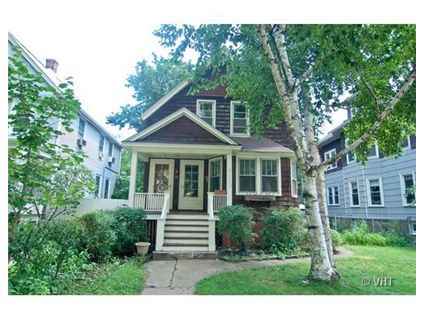
Built in 1906, the listing says a buyer can keep the property as a 2-flat or convert it into a single family home.
Constructed on a 45×175 lot, the listing says it needs “TLC and updating.”
But it still has some of its vintage bones including wood floors and built-ins in one of the dining rooms.
There is no central air, just window units.
The listing also says there is a 1-car detached garage.
Does this property make financial sense if you want to live in one and rent out the other? The public listing does not provide information about rental rates or gross income of the property.
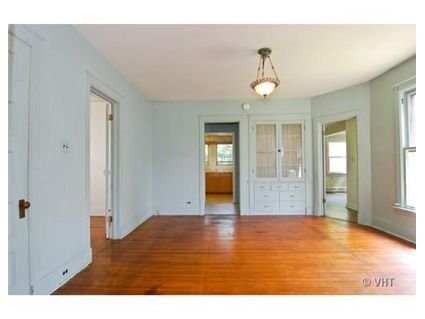
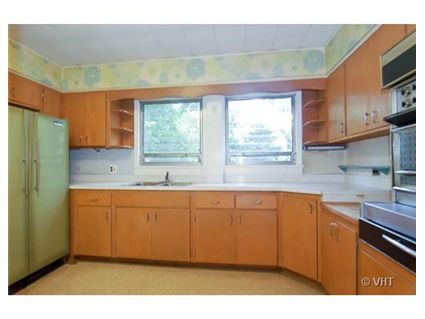
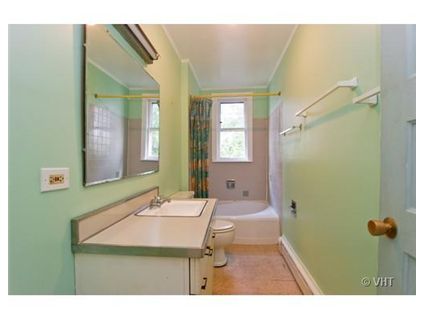
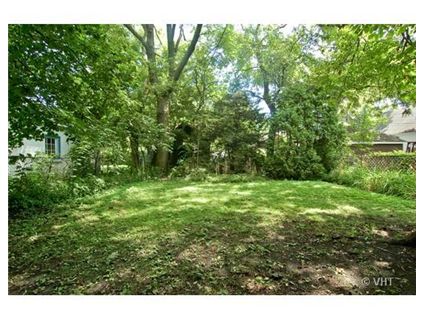
Gordon Smith at Baird and Warner has the listing. See more pictures here.
1013 Ashland in Evanston: 2-flat, 5 bedrooms, 2 bathrooms, 1 car garage
- Sold before 1988
- Currently listed for $295,000
- Taxes of $9349
- No central air
Awesome. I want. Seriously, reminds me of all the great towns in the burbs back home on the Main Line. Taxes are silly for the value though. What would it cost to put renovate into a SFH, add AC, and keep all the old floors, doors, etc? New kitchen though…
I bet this is an estate sale
renos would be like 40-50K min.(not including exterior work) seems the floor plan is a bit small.
Love it.
To do it right with quality materials and decent craftsmanship, I would estimate around 50-60% of the purchase price to bring everything up to date. Kitchen alone would run $40-60k. Some wall removal/reorganization. Floors would need to be refinished, insulation installation, prime and paint, lighting, bathroom ($10-15k) window & door replacements ($10k) yard would be totally redone with major trimming/removal, new plantings, sod, privacy fencing, etc.
If that is baseboard heating, you would need to install ductwork for the AC, insulation throughout… but with the size of house, it wouldn’t be that great an expense.
Lots of work, but in the end you’d have a very nice albeit small home to enjoy for years.
Those taxes need to be appealed.
It’s cool but in the crappy part of Evanston and further from Metra than it looks.
Lot’s more like this in Evanston. Taxes are the result of the freeloading NWU.
“further from Metra than it looks.”
Looks like ~1 mile and then I measured, and it’s (slightly) less than that.
Wouldn’t be anyone’s first choice of location in Evanston, but hardly the worst, either.
“Taxes are the result of the freeloading NWU.”
You mean that organization that provides it’s own services (including police force) and brings a constant flow of 10,000 kids dumping their disposable income all over the town? Yeah, sounds like a real drain.
NU pays at least $5 million in taxes yearly to the city of Evanston, while being exempt from property taxes.
Aside from the economic contributions NU students and their families make to Evanston restaurants and hotels, over the years the university has also been increasing city revenue by selling land back to Evanston.
Northwestern now owns about 160 acres of its original 500.
The property that has been sold back to the city of Evanston is now generating between $5 – 6 million in annual property taxes.
Any and all budget problems in Evanston belong to the city of Evanston and it’s City Council, not with Northwestern.
BTW: I like this house. Definitely needs TLC inside and out, though.
Northwestern does not provide all of its own services and clearly drains resources in other ways (fire, police outside of deputized area, etc) and it doesn’t pay taxes, which was the aforementioned point.
That is in fact prime lakefront land (in addition to quite a bit of property in the “downtown” area). If it were Wilmette, Kenilworth or Winnetka up the line, it would sell for for $3,000,000 an acre. And it would be taxed accordingly (50k per year per lot I bet). Multiply that by 200 or so lots and you are talking real money ($10M more per year).
Taxes in Evanston are 6.6% on EAV (roughly depending on park and service district) compared to 4.8% on EAV in the city. That is a pretty big difference. It is about $5k per year more for a $1M market value home.
Even wealthy suburbs up the way like Kenilworth and Winnetka have much lower taxes (in the 5%-ish range) with far better schools and services (hell I will take a dedicated police force for my 2000 person town, who wouldnt?).
i am not well versed on evanston, but i always thought you want to be east of ridge and east of greenbay until central? had a buddy in Junior college that lived by emerson and dodge, wasnt a great area.
By the way, this part of Evanston (close to Dodge and ETHS) is blighted in spots and certainly socioeconomically challenged. Crime is a factor here as well. Homes can be purchased in this area for around 100k.
Taking a page from HD:
http://www.redfin.com/IL/Evanston/1522-Crain-St-60202/home/13604953
What trips people up is that Evanston has a composition which mirrors the typical big city and not the typical suburb. There are wealthy areas, middle class areas and areas that have high rates of poverty. This neighborhood is decidedly lower income.
Is a $250k home a steal in Austin? Probably not. Is it a steal here in a neighborhood which is similar? Probably not.
Median income in the area (I suspect that means census tract) is 67K. That’s decent.
“Is a $250k home a steal in Austin? Probably not. Is it a steal here in a neighborhood which is similar? Probably not.”
You’re going to make Groove cry, my man. Be nice.
Northwestern v. Evanston is an ongoing debate, and one which makes no sense to me. I went to Northwestern. But I’ve also lived in Evanston as a tax paying non-student. The notion that Northwestern is bad for Evanston is just silly.
Northwestern is the reason Evanston exists in its current form (in fact, it predates Evanston). Without Northwestern, Evanston would look like Wilmette (pretty houses with nothing to do). With Northwestern, Evanston is one of the more interesting suburbs you can imagine. It has a downtown, it has a walkling culture, it has a great farmer’s market, it has a great hospital, it has an arts and restaurant scene, etc.
As for the “prime lake front land” complaint: (1) Northwestern owned that land before Evanston existed; (2) much of that land didn’t exist until Northwestern built it (i.e., half the university is “lakefill”); and (3) Northwestern may not pay taxes on it, but it also leaves it open for public use (unlike all the tax paying mansions further north).
All that said, it’s a pretty easy test. Residents of Evanston can bitch and moan about taxes, but if Northwestern announced tomorrow it’s leaving the city, do you think they’d be happy . . . or would they be worried about what’s going to happen to all their urban amenities, their property values, etc.?
Kudos to the posters who note what a drain on services are the “not-for-profit” organizations who own vast tracts of land, such as churches and educational educational institutions.
Add to these the recipients of Corporate Welfare such as tax abatements and TIF districts that suck two thirds of the district’s property taxes and convey them to the developer’s coffers, you can see why property taxes are at confiscatory levels.
Once, while living in another city, I played a little game called “See how much taxable property you can find on XXXX Blvd.” On any given major artery, about two thirds of the frontage was tax-exempt because it was owned and used by a church, school or other non-profit, or tax-abated, or abandoned to the city for delinquent taxes.
No wonder the municipalities and states are so broke.
I am not familiar with austin, but this part of evanston is ok. you want to stay away from the spot north of howard between chicago ave and ridge. also the blocks surrounding the hs. there are some other bad blocks but this location is not scary.
east of greenbay until mccormick groove. and not east of ridge until you get to oakton, at least. before that you want to be east of the tracks.
nu cops are a pain in the ass. bastards chased me down trying to get home to watch game 1 of the 98 nba finals. I didnt want to pull over for rent a cops, turns out they are sworn police officers and can hand out legit tickets. And they get kind of worked up when you don’t pull over.
nu coeds are nice.
I recall that half of Evanston’s land area has tax-exempt non-profit ownership – universities, colleges, churches, private schools, hospitals, non-profit agencies, etc. I think only River Forest begins to approach Evanston’s tax-burden ratio. Tax-exempt universities and colleges consume a significant amount of municipal services – police (arrests/crimes), fire, sewer, water, building inspection/permits, traffic control, etc, aside from the acreage removed from the real estate tax rolls for perpetuity. Some cities do receive PILOT (payment in lieu of taxes) payments from their universities. New Haven receives a large payment from Yale, for instance. Most universities and colleges refuse to enter PILOT agreements unless a compelling problem finally forces them to concur with their struggling muncipality, ignoring that these schools are notable financial burden to their communities. Where there is little commercial or industrial tax-base, the homeowners’ real estate taxes must subsidize those institutions and those taxes reflect a significant cost premium.
This may not be the best area, but it’s nowhere near Austin. Rogers Park, with much better schools, is a much better comparison.
Complaining about taxes in Evanston is pointless, since you can just move to Glenview, pay less taxes and not have Northwestern and its benefits.
Comparing a university to churches / hospitals / etc. makes no sense. A university brings in thousands of young people with disposable income, most of whom have no interest in competing for existing jobs. So they dump a bunch of money into the economy and take very little out. This is why most university towns are considered places that provide a very high quality of life.
And none of the arguments above answers the question: Is Northwestern a net positive for Evanston? Would Evanston property values go up or down if Northwestern left? I know how I’d bet. And sammyg’s simple point shows why: people could easily move, but they don’t, because the benefits outweigh the so-called “burden.”
…don’t forget synagogues in that list.
“Kudos to the posters who note what a drain on services are the “not-for-profit” organizations who own vast tracts of land, such as churches and educational institutions.”
This part of Evanston has bad schools, crime and is generally unappealing for a middle to upper middle class family. And yes, I think it compares similarly to Austin.
Evanston and Northwestern were basically founded at the same time in the 1850 time frame. As most people know, Chicago was just in its infancy then.
I’m currently an Evanstoner, and really like it here. It is very chill, especially by the lake. Lots of hot mommies with cute dogs.
Presence of a university may provide some perceived prestige to residential homeowners, but it never translates into a “net revenue benefit” from a fiscal budgetary standpoint. Universities are costly non-revenue generating entities within their muncipality, while nonetheless consuming significant municipal resources. There may be slightly more relative sales tax revenue realized by municipality (as 1% tax revenue, not 10.25%), but students’ collective purchasing power is not extraordinary tax revenue income that exceeds rendered municipal services’ costs. Evanston’s attractiveness to home purchaser has more to do with housing proximity to employment, housing stock character and condition, reputation of community (“nice place to live”), and perception of school quality. Northwestern exists within Evanston, but it isn’t solely or significantly responsible for existence of Evanston’s downtown, or for the recent high-rise based redevelopment of that downtown.
Evanston is lucky to have a downtown retail center which can absorb students’ purchasing-related sales tax revenue. River Forest has two university college campuses, Concordia and Dominican, and very little retail (CVS, Walgreens, Whole Foods, Anne Taylor Loft, and Starbucks) to realize any significant sales tax boost. Yet both universities consume significant municipal services in a very small (14,000 residents) community without any PILOT payments.
Concordia/Dominican does not equal Northwestern. Not even close. Proves the point. If you have Concordia/Dominican you don’t have urban benefits. If you have Northwestern you do.
One thing to note about the sales tax – since it is an aspect clearly targeted at the student population – check out the alcohol tax in Evanston.
But it’s not just about sales tax. How much of Evanston is student apartment housing? Alot because NU doesn’t guarantee housing after freshman year. What does that mean? It means you have a huge number of properties paying the higher/non-homeowner rate. And what do you think the real estate tax is on those commercial properties. Would it be higher or lower if the space wasn’t so lucrative due to the university population dropping their money there?
And forget the tax altogether . . . what about the money in the first instance? 10,000 kids who don’t have cars and have to spend all their money in one place. The result is a thriving downtown economy flush with cash. To discount this benefit to the community is silly.
As I said before, Northwestern predates Evanston by about 10 years. So another way to phrase these complaints would be: “I have an idea. Let’s start a town next to that new university. Then we can whine they are paying us taxes.”
I’d rather own this 2-flat than 2754 Hampden.